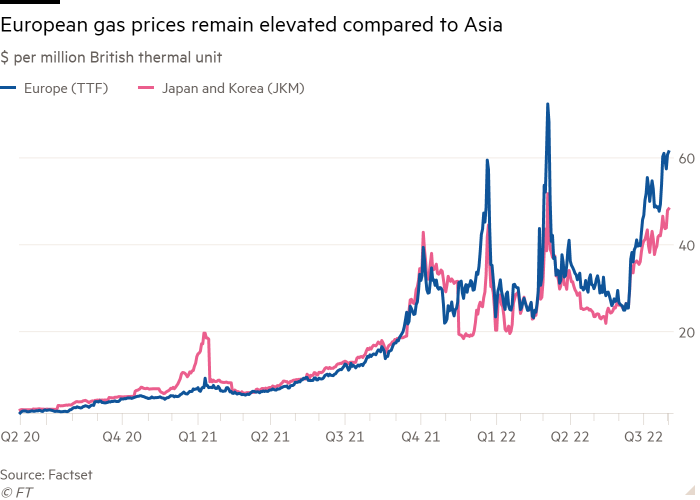This article is an on-site version of our FirstFT newsletter. Sign up to our Asia, Europe/Africa or Americas edition to get it sent straight to your inbox every weekday morning
Good morning. Liz Truss, the Tory leadership frontrunner, claimed yesterday that she could avert a recession if she became prime minister, as the Bank of England warned that Britain faced a protracted downturn.
The UK foreign minister, who has promised immediate tax cuts if she wins, said during a Sky News leadership debate that the BoE’s projected economic slump, which could last through next year, could yet be averted.
“We can change the outcome and make it more likely the economy grows” — Liz Truss
Truss promised to reverse plans by her rival Rishi Sunak, the former chancellor, to increase corporation tax from 19 per cent to 25 per cent, while scrapping green levies on energy bills and a national insurance rise.
Sunak is trailing Truss in all party member opinion polls, with some pointing to a lead of 30 points or more. But after the Sky News debate, the audience, in a show of hands, significantly favoured Sunak.
The televised debate came the same day that the central bank raised interest rates sharply by 0.5 percentage points to 1.75 per cent and forecast inflation would hit 13 per cent by the end of the year.
The BoE’s gloomy view of the immediate economic outlook came as a shock to analysts, who believe it wants to unleash a sharp downturn to curb surging inflation.
-
Opinion: To stamp her authority in office, Truss should appoint a cabinet that represents the full spectrum of Tory views, writes Sebastian Payne.
How well did you keep up with the news this week? Take our quiz. Thanks for reading FirstFT Europe/Africa. Have a great weekend — Jennifer
Five more stories in the news
1. Ukraine calls for extensions to Black Sea grain deal Taras Kachka, Ukraine’s trade negotiator and deputy economy minister, has called for the deal that relaxes Russia’s blockade on grain exports to be extended to other products such as metals after the first successful use of the route.
2. Coinbase forges BlackRock deal over crypto access Coinbase has announced a deal with BlackRock that will give the asset manager’s clients more seamless access to digital asset markets, in the latest sign of traditional investors dabbling in cryptocurrencies.
3. Visa and Mastercard cut ties with Pornhub owner’s ad arm The payment networks will stop working with the advertising arm of MindGeek, the owner of Pornhub, after a court ruling found that Visa could be held liable for illegal content on the user-generated pornography website.
4. Russian court sentences Brittney Griner to nine years in prison Prosecutors have sentenced the US basketball player to nine years in jail on charges of drug smuggling, raising the stakes of a proposed prisoner swap that could include Russian arms trafficker Viktor Bout.

5. Wildfires consume almost all forest carbon offsets in 100-year reserve As a result of fires, six forest projects in California’s carbon trading system have released between 5.7mn and 6.8mn tonnes of carbon since 2015, according to a non-profit research group, depleting at least 95 per cent of all carbon credits set aside in reserve by forestry projects in the US.
The day ahead
Erdoğan meets Putin Turkish president Recep Tayyip Erdoğan will meet his Russian counterpart Vladimir Putin in the Black Sea resort of Sochi to discuss military co-operation. (Yahoo)
Economic data In the UK, the Halifax monthly house price index is due. Analysts expect US job growth in July to have continued at a strong pace, but slower than in June. The Federal Reserve publishes consumer credit figures. (FT, WSJ)
Celebrations As well as International Beer Day, Brighton’s streets will be awash with glitter as one of the UK’s largest Pride events begin today. The annual LGBT+ parade will see thousands flock to the south coast.
What else we’re reading
Europe and Asia battle to secure gas supplies The race to lock in liquefied natural gas supplies for winter is raising the risks of a further price surge, adding fuel to the cost of living crisis. Competition has intensified as Europe seeks to replace natural gas from Russia, increasing pressure on countries such as Japan and South Korea, the world’s second and third-biggest importers of LNG.

Britain’s anxious generation Across the country, schoolchildren this year are probably the most fragile, inadequately prepared and unhappy group ever to collect A-level results. Lucy Kellaway explains why, and what schools are doing to tackle a looming mental health crisis.
In 50 years, will anyone live in central Spain? You would think climate change would be the top priority in a hot dry country, but in fact, Spaniards spend more time arguing about national unity, following the trauma of Catalonia’s illegal independence referendum in 2017. Simon Kuper writes that global warming is threatening the world’s most liveable country.
Ukrainian refugees relying on the kindness of strangers More than 6mn people have fled since Russia launched its full-scale invasion of Ukraine. Hundreds have shared their stories with the Financial Times of the anxiety of fleeing a war zone, the difficulty of adjusting to unfamiliar countries and their hopes for the future. Hardship, heartache and uncertainty were constants, but so too were acts of kindness.
Market rally delivers hard lessons Oh, poor fund managers. Why the long faces? July was one of the best months of all time. But it might not be the rebound we’ve all been waiting for. Too much money has been tied up in a safe hidey hole and too little deployed on the upswing, writes Katie Martin.
Books
Acclaimed Pakistani-born novelist Mohsin Hamid lives in an imaginary homeland, one that he attempts to realise in books. He speaks with the FT on placelessness, “the art of politically engaged art” and his new book The Last White Man.
Thank you for reading and remember you can add FirstFT to myFT. You can also elect to receive a FirstFT push notification every morning on the app. Send your recommendations and feedback to firstft@ft.com. Sign up here.


